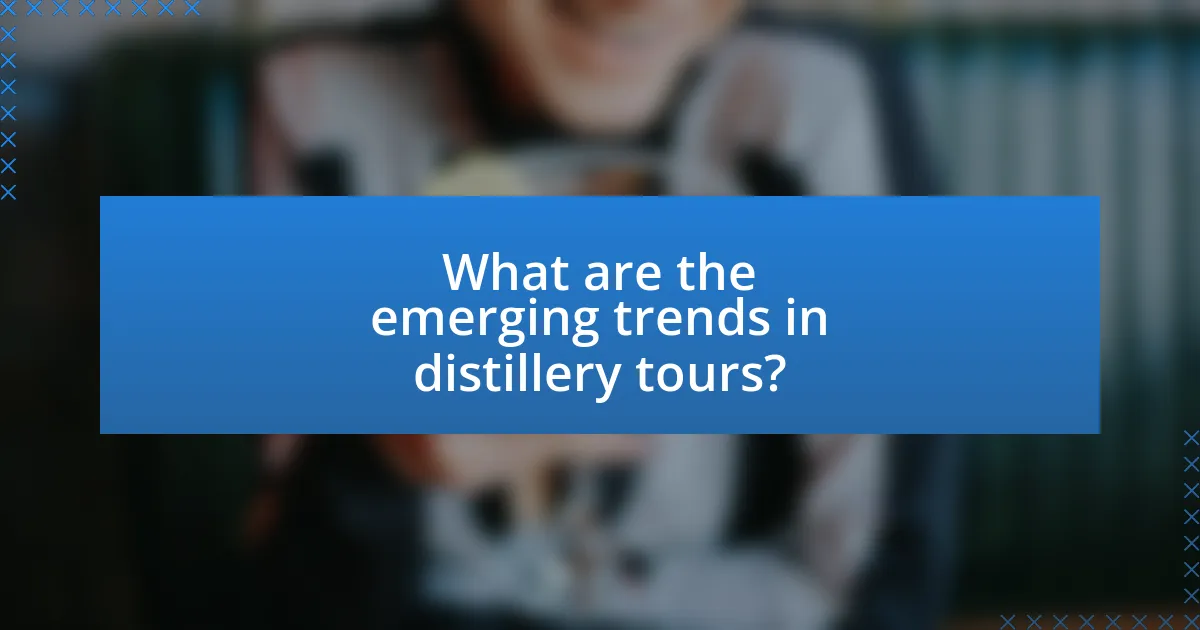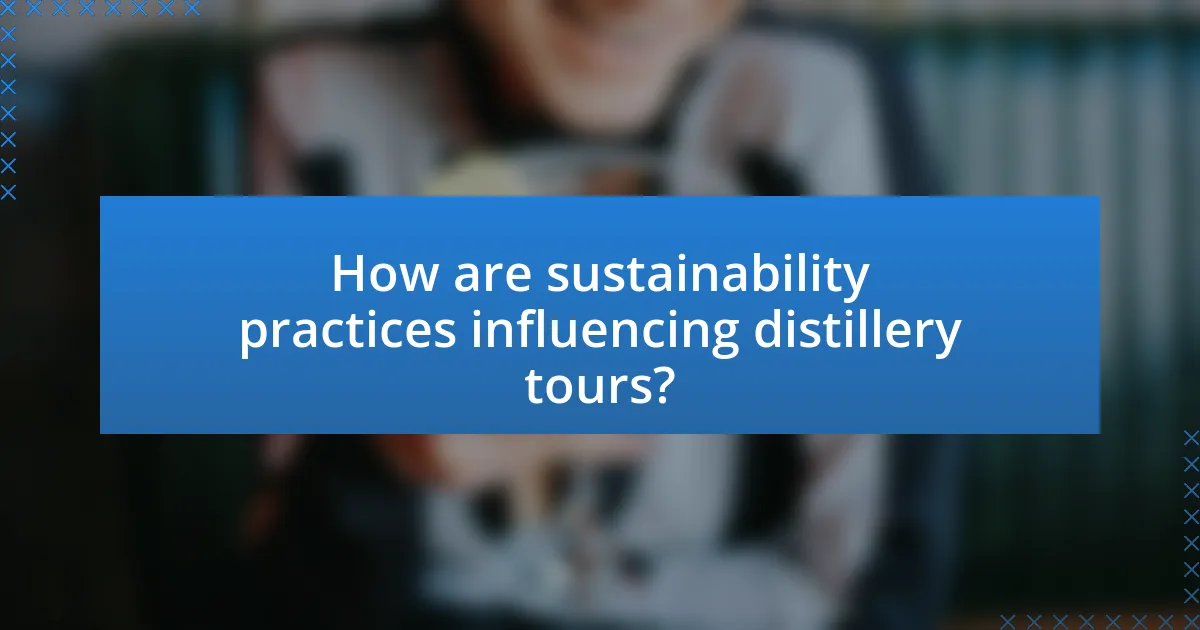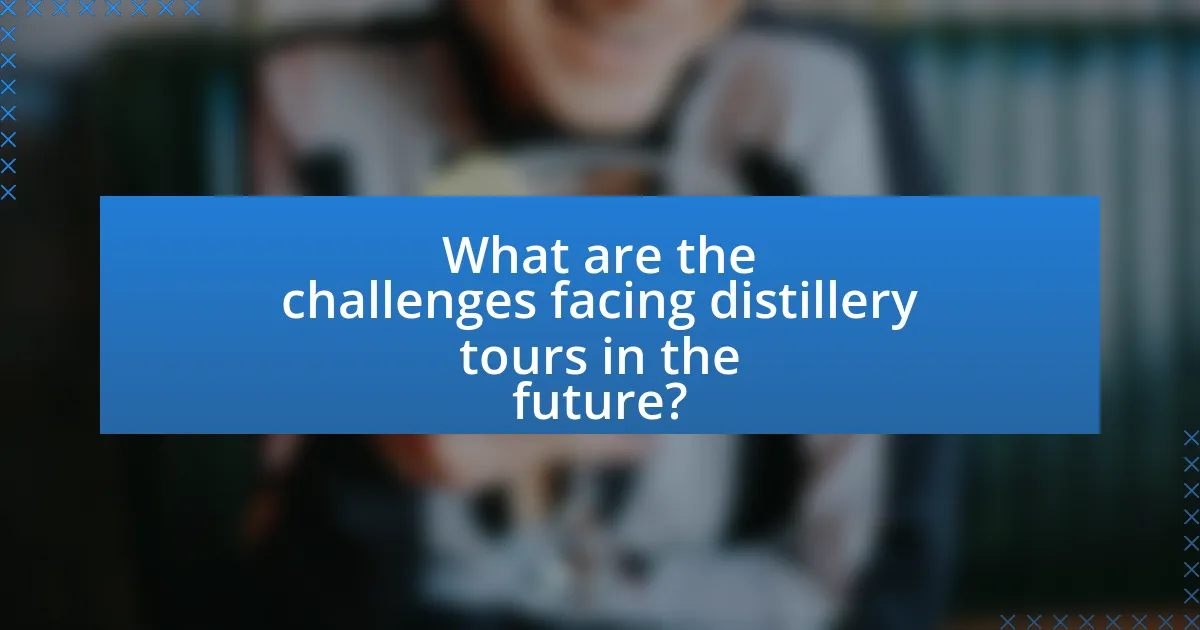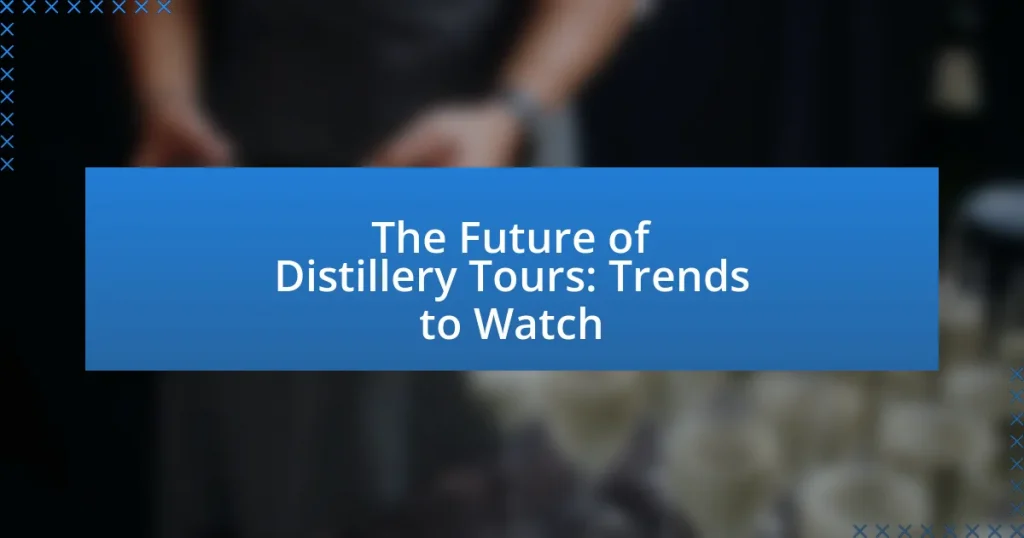The article focuses on the future of distillery tours, highlighting emerging trends such as personalized experiences, sustainability initiatives, and the integration of technology. It examines how consumer preferences are shaping these tours, with visitors increasingly seeking immersive and educational interactions that enhance their understanding of distillation. The role of technology, including virtual and augmented reality, is discussed as a means to improve engagement and accessibility. Additionally, the article addresses the impact of sustainability practices and local sourcing on visitor experiences, as well as the challenges distilleries face in adapting to changing economic conditions and regulatory environments. Overall, it provides a comprehensive overview of the evolving landscape of distillery tourism.

What are the emerging trends in distillery tours?
Emerging trends in distillery tours include personalized experiences, sustainability initiatives, and the integration of technology. Personalized experiences allow visitors to tailor their tours based on preferences, enhancing engagement and satisfaction. Sustainability initiatives are increasingly prioritized, with distilleries adopting eco-friendly practices, such as using renewable energy and sourcing local ingredients, to appeal to environmentally conscious consumers. The integration of technology, such as augmented reality and virtual tours, enhances visitor interaction and accessibility, making distillery tours more informative and engaging. These trends reflect a shift towards more immersive, responsible, and customized experiences in the distillery tourism sector.
How are consumer preferences shaping distillery tours?
Consumer preferences are significantly shaping distillery tours by driving demand for personalized and immersive experiences. Visitors increasingly seek unique, educational interactions that go beyond traditional tastings, prompting distilleries to offer tailored tours that include behind-the-scenes access, interactive sessions with distillers, and opportunities to learn about the production process. According to a 2022 survey by the Distilled Spirits Council, 75% of consumers expressed a preference for experiences that allow them to engage directly with the craft of distillation, highlighting a shift towards experiential tourism in the spirits industry. This trend is leading distilleries to innovate their offerings, ensuring they meet the evolving expectations of consumers who prioritize authenticity and engagement in their visits.
What experiences are visitors seeking in distillery tours?
Visitors are seeking immersive and educational experiences in distillery tours. These experiences often include guided tastings, interactive sessions with distillers, and insights into the production process, which enhance their understanding of the craft. According to a survey by the Distilled Spirits Council, 70% of participants indicated that they value learning about the history and techniques behind their favorite spirits during tours. This trend reflects a growing interest in authenticity and craftsmanship among consumers, driving distilleries to offer more engaging and informative experiences.
How does personalization enhance the distillery tour experience?
Personalization enhances the distillery tour experience by tailoring the visit to individual preferences and interests, resulting in a more engaging and memorable experience. When tours are customized, participants can explore specific aspects of the distillation process, sample products that align with their tastes, and receive insights that resonate with their personal backgrounds or knowledge levels. Research indicates that personalized experiences increase customer satisfaction and loyalty; for instance, a study by McKinsey & Company found that personalization can lead to a 10-30% increase in customer satisfaction. This tailored approach not only fosters a deeper connection to the brand but also encourages repeat visits and positive word-of-mouth referrals.
What role does technology play in the future of distillery tours?
Technology will significantly enhance the future of distillery tours by improving visitor engagement and operational efficiency. Innovations such as virtual reality (VR) and augmented reality (AR) will allow guests to experience immersive tours, providing insights into the distillation process and the history of the distillery without physical constraints. Additionally, mobile applications can facilitate personalized experiences, offering tailored information and interactive elements that cater to individual preferences. Data analytics will enable distilleries to optimize tour schedules and manage visitor flow, enhancing overall customer satisfaction. According to a report by the Distilled Spirits Council, 70% of distilleries are expected to adopt advanced technologies by 2025, indicating a strong trend towards tech integration in the industry.
How are virtual and augmented reality transforming distillery tours?
Virtual and augmented reality are transforming distillery tours by enhancing visitor engagement and providing immersive experiences. These technologies allow guests to explore the distillation process and the history of the distillery in a more interactive manner, often through virtual simulations or augmented overlays that provide additional information about the production process. For instance, visitors can use AR applications to see how ingredients are transformed into spirits in real-time, or participate in virtual tastings that simulate the sensory experience of sampling different products. This shift not only enriches the educational aspect of tours but also caters to a broader audience, including those unable to visit in person, thereby expanding the reach of distilleries.
What technological innovations are being adopted by distilleries?
Distilleries are adopting several technological innovations, including automation, data analytics, and virtual reality. Automation enhances production efficiency by utilizing robotic systems for tasks such as bottling and labeling, which reduces labor costs and increases consistency. Data analytics allows distilleries to monitor fermentation and aging processes in real-time, leading to improved quality control and product development. Virtual reality is being used to create immersive distillery tours, enabling customers to experience the distillation process and the history of the brand from anywhere, thus enhancing customer engagement and marketing efforts. These innovations are reshaping the operational landscape of distilleries, making them more efficient and customer-focused.

How are sustainability practices influencing distillery tours?
Sustainability practices are significantly influencing distillery tours by enhancing visitor engagement and promoting eco-friendly initiatives. Distilleries are increasingly adopting sustainable methods such as using renewable energy sources, recycling water, and sourcing local ingredients, which resonate with environmentally conscious consumers. For instance, a survey by the Distilled Spirits Council found that 70% of consumers prefer brands that demonstrate a commitment to sustainability. This shift not only attracts more visitors but also educates them about responsible production practices, thereby fostering a deeper connection between consumers and the brand.
What sustainable practices are distilleries implementing?
Distilleries are implementing sustainable practices such as water conservation, energy efficiency, and waste reduction. For instance, many distilleries are utilizing closed-loop water systems to minimize water usage during production, which can reduce water consumption by up to 90%. Additionally, distilleries are investing in renewable energy sources, like solar and wind power, to lower their carbon footprint. Furthermore, they are adopting practices like repurposing spent grains for animal feed or composting, which helps in reducing waste. These initiatives not only enhance environmental sustainability but also appeal to eco-conscious consumers, aligning with the growing trend of sustainability in the beverage industry.
How do eco-friendly initiatives attract visitors to distilleries?
Eco-friendly initiatives attract visitors to distilleries by appealing to the growing consumer demand for sustainable practices. Distilleries that implement green practices, such as using renewable energy sources, reducing waste, and sourcing local ingredients, enhance their brand image and resonate with environmentally conscious consumers. For instance, a study by Nielsen found that 66% of global consumers are willing to pay more for sustainable brands, indicating that eco-friendly initiatives can significantly influence visitor choices. Additionally, distilleries that offer tours highlighting their sustainable practices often provide unique experiences, such as organic tastings or educational workshops, further drawing in visitors who value both quality and environmental responsibility.
What impact does sustainability have on the distillery’s brand image?
Sustainability significantly enhances a distillery’s brand image by aligning it with consumer values focused on environmental responsibility. Distilleries that adopt sustainable practices, such as using renewable energy sources or implementing water conservation measures, are perceived as more trustworthy and socially responsible. Research indicates that 66% of consumers are willing to pay more for sustainable brands, demonstrating a direct correlation between sustainability efforts and consumer purchasing behavior. This positive perception can lead to increased customer loyalty and a stronger market position, as brands that prioritize sustainability often attract a dedicated customer base that values ethical practices.
Why is local sourcing becoming important in distillery tours?
Local sourcing is becoming important in distillery tours because it enhances authenticity and supports local economies. Distilleries that use locally sourced ingredients can offer unique flavors that reflect the regional terroir, which attracts tourists seeking genuine experiences. According to a 2021 report by the Distilled Spirits Council, 70% of consumers prefer products made with local ingredients, indicating a strong market demand for local sourcing. This trend not only fosters community relationships but also promotes sustainability by reducing transportation emissions and encouraging responsible agricultural practices.
How does local sourcing enhance the visitor experience?
Local sourcing enhances the visitor experience by providing authentic, region-specific products that reflect the local culture and community. This connection to the local environment fosters a deeper appreciation for the distillery’s offerings, as visitors engage with ingredients and flavors unique to the area. For instance, distilleries that utilize locally sourced grains or botanicals often highlight these elements in their tours and tastings, allowing visitors to understand the significance of local agriculture and craftsmanship. Research indicates that 70% of consumers prefer products made from local ingredients, which enhances their overall satisfaction and loyalty to the brand.
What benefits does local sourcing provide to distilleries?
Local sourcing provides distilleries with enhanced quality, reduced transportation costs, and stronger community ties. By sourcing ingredients locally, distilleries can ensure fresher and higher-quality raw materials, which directly impacts the flavor and uniqueness of their products. Additionally, local sourcing minimizes transportation expenses and carbon footprint, making operations more sustainable. Furthermore, engaging with local farmers and suppliers fosters community relationships, which can lead to increased customer loyalty and support for local economies. These benefits collectively contribute to the overall success and sustainability of distilleries in a competitive market.

What are the challenges facing distillery tours in the future?
The challenges facing distillery tours in the future include increasing competition, evolving consumer preferences, and regulatory changes. Distilleries must contend with a growing number of competitors in the beverage industry, which can dilute market share and customer interest. Additionally, consumers are increasingly seeking unique and personalized experiences, necessitating that distilleries adapt their offerings to meet these expectations. Regulatory changes, particularly those related to alcohol production and tourism, can impose new operational constraints that affect how distilleries conduct tours and engage with visitors. These factors collectively pose significant hurdles for distillery tours as they strive to remain relevant and appealing in a dynamic market.
How are economic factors affecting distillery tours?
Economic factors significantly influence distillery tours by affecting consumer spending and tourism trends. For instance, during economic downturns, disposable income decreases, leading to reduced participation in leisure activities such as distillery tours. According to the National Distillers Association, a 10% decline in consumer confidence can result in a 15% drop in tour attendance. Conversely, in a robust economy, increased disposable income encourages more individuals to engage in experiential activities, including distillery visits. Additionally, fluctuations in travel costs, such as fuel prices and airfare, directly impact tourism, which in turn affects the number of visitors to distilleries. Thus, economic conditions play a crucial role in shaping the demand for distillery tours.
What impact does tourism fluctuation have on distillery operations?
Tourism fluctuation significantly impacts distillery operations by affecting visitor numbers and revenue. When tourism increases, distilleries often experience higher foot traffic, leading to increased sales of tours, tastings, and merchandise. For instance, a study by the Distilled Spirits Council indicated that distilleries in regions with high tourist activity saw revenue growth of up to 30% during peak seasons. Conversely, during off-peak times, reduced visitor numbers can lead to decreased sales and potential operational cutbacks, as distilleries may struggle to cover fixed costs. This cyclical nature of tourism necessitates that distilleries adapt their marketing strategies and operational plans to align with seasonal trends, ensuring sustainability and profitability.
How can distilleries adapt to changing economic conditions?
Distilleries can adapt to changing economic conditions by diversifying their product offerings and enhancing their marketing strategies. By introducing new spirits or limited-edition releases, distilleries can attract a broader customer base and respond to shifting consumer preferences. For instance, during economic downturns, premium products may see a decline in sales, prompting distilleries to offer more affordable options or value packs. Additionally, leveraging digital marketing and e-commerce platforms allows distilleries to reach consumers directly, which can mitigate the impact of reduced foot traffic during challenging economic times. Historical data shows that distilleries that embraced online sales during the COVID-19 pandemic were able to maintain revenue streams despite physical restrictions.
What regulatory challenges do distilleries face?
Distilleries face significant regulatory challenges primarily related to licensing, taxation, and compliance with health and safety standards. The Alcohol and Tobacco Tax and Trade Bureau (TTB) requires distilleries to obtain federal permits, which can be a lengthy and complex process. Additionally, state and local regulations often impose further licensing requirements and varying tax rates, complicating operations. For instance, some states have strict laws governing the sale and distribution of alcohol, which can limit a distillery’s market access. Compliance with health regulations, including sanitation and labeling requirements, adds another layer of complexity, as failure to adhere can result in fines or shutdowns. These regulatory hurdles can hinder growth and innovation within the industry.
How do regulations impact the visitor experience in distillery tours?
Regulations significantly impact the visitor experience in distillery tours by dictating the operational standards and safety protocols that must be followed. These regulations ensure that distilleries maintain quality control, adhere to health and safety guidelines, and provide accurate information about their products. For instance, regulations may require distilleries to limit alcohol sampling to a certain amount, which can affect how visitors engage with the tasting experience. Additionally, compliance with labeling laws ensures that visitors receive clear and truthful information about the spirits they are consuming, enhancing their overall understanding and appreciation of the products. Such regulatory frameworks ultimately shape the quality and safety of the visitor experience, fostering trust and satisfaction among attendees.
What strategies can distilleries employ to navigate regulatory hurdles?
Distilleries can navigate regulatory hurdles by implementing comprehensive compliance programs that include regular training for staff on local, state, and federal laws. These programs ensure that employees are well-informed about the legal requirements governing production, labeling, and distribution. Additionally, distilleries can engage with legal experts to conduct audits and identify potential compliance gaps, which helps in proactively addressing issues before they escalate. Furthermore, establishing strong relationships with regulatory agencies can facilitate smoother communication and provide insights into upcoming changes in regulations. For instance, the Alcohol and Tobacco Tax and Trade Bureau (TTB) offers resources and guidance that distilleries can utilize to stay compliant.
What best practices can enhance the future of distillery tours?
To enhance the future of distillery tours, implementing interactive and immersive experiences is essential. Engaging visitors through hands-on activities, such as blending their own spirits or participating in tastings led by knowledgeable staff, fosters a deeper connection to the product. Research indicates that experiential learning increases retention and satisfaction, with studies showing that 70% of consumers prefer experiences over material goods. Additionally, incorporating technology, such as augmented reality or mobile apps, can provide informative content and enhance visitor engagement. By focusing on personalized experiences and leveraging technology, distilleries can create memorable tours that resonate with consumers and drive repeat visits.
How can distilleries create memorable experiences for visitors?
Distilleries can create memorable experiences for visitors by offering immersive tours that engage multiple senses and provide educational insights into the distillation process. These experiences often include guided tastings, where visitors sample various spirits while learning about their production, history, and flavor profiles. For instance, distilleries that incorporate interactive elements, such as blending workshops or sensory stations, enhance visitor engagement and retention of information. Research indicates that experiential learning significantly improves visitor satisfaction and recall, making the experience more impactful. Additionally, incorporating local culture and storytelling into the tours can deepen emotional connections, as evidenced by the growing trend of distilleries partnering with local artisans and chefs to create unique tasting events that reflect regional heritage.
What marketing strategies are effective for promoting distillery tours?
Effective marketing strategies for promoting distillery tours include leveraging social media, creating engaging content, and offering promotions or discounts. Social media platforms like Instagram and Facebook allow distilleries to showcase their unique offerings and engage with potential visitors through visually appealing posts and stories. Engaging content, such as behind-the-scenes videos or educational blog posts about the distillation process, can attract interest and inform potential customers. Additionally, offering promotions, such as group discounts or seasonal packages, can incentivize bookings and increase visitor numbers. These strategies are supported by data indicating that 54% of consumers use social media to research products before making a purchase, highlighting the importance of a strong online presence in attracting visitors to distillery tours.


